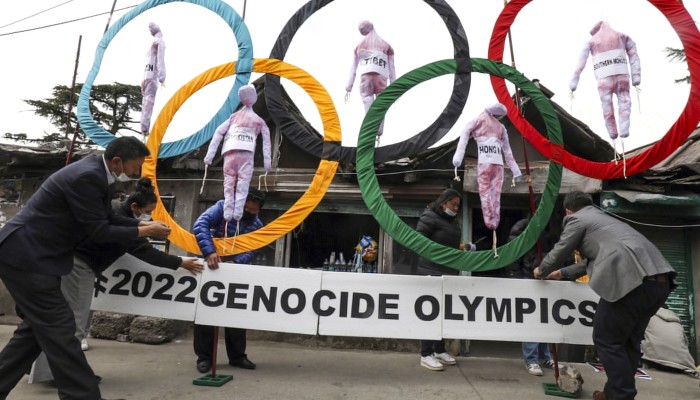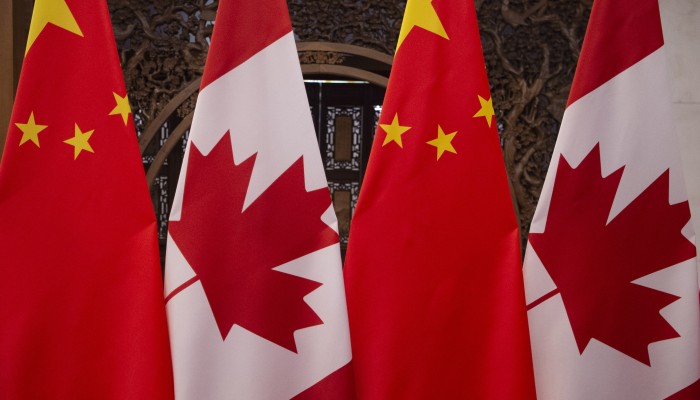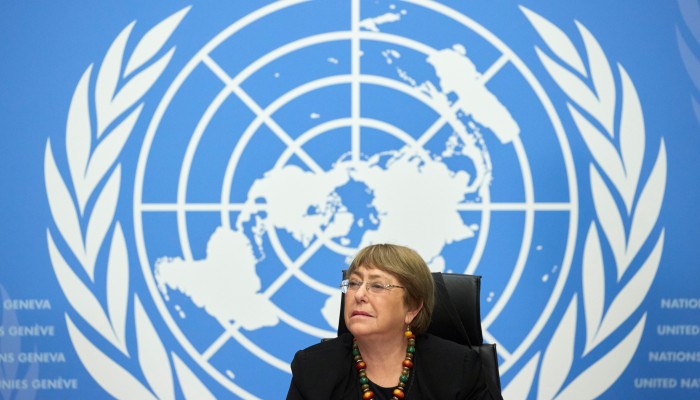Hello again,
Top Chinese officials and advisers will meet at the "two sessions" this week to lay out policies for the year ahead amid growing Western criticism of the nation’s human rights record. That record is already impacting its relations and threatens to get worse in the year ahead, with growing calls for a boycott of the Beijing Winter Olympics in February next year. How exactly this will play out is uncertain, other than it will take up the time and attention of policymakers in Beijing and other capitals around the world. How do you proceed when you can’t even agree on the definition of human rights?
“Human rights” is a loaded term at any time, but especially when it comes to relations between China and the West.
Developed western countries believe there is an international standard for human rights that is universal, not subject to interpretation by national priorities. China, on the other hand, rejects the idea of universal human rights and argues that national circumstances and development status must be taken into account in making judgments.
China has worked hard promoting a narrative in opposition to western criticism. Many developing countries, anxious to avoid criticism of their own practices and eager for China’s economic support, have sided with Beijing. In a United Nations vote in October last year on a western resolution calling on China to live up to its human rights obligations, more countries backed China than backed the West.
But Western voices criticising China’s record in Xinjiang province and Hong Kong have grown louder in recent months.
United Nations human rights chief Michelle Bachelet late last month criticised China for restricting basic human rights and political freedoms - including in Hong Kong - in the name of national security.
China again rejected accusations of human right violations in Xinjiang, welcoming a visit by diplomats to check facts on the ground. This repeated an invitation made last September, which did not dampen criticism of Beijing.
Europe’s top diplomat at the United Nations criticised China by name in September. And Germany’s ambassador to China said Beijing should open a new dialogue on major issues, including human rights, if it hopes to improve relations with Europe.
The growing conflict over human rights is spilling into economic affairs between China and Europe. Rising criticism about China’s human rights record in Xinjiang and its crackdown on Hong Kong are threatening to jeopardise ratification in the European Parliament of the new investment treaty reached by Beijing and Brussels at the end of December.
Increasing European Union imports of products linked to allegations of forced labour has only added to pressure on EU politicians to act. European parliamentarians have discussed imposing sanctions on Chinese officials for alleged rights violations. The British government announced in January a new policy to end supply chain links to Xinjiang.
In its last months in office, the Trump administration sanctioned Chinese and Hong Kong officials for their part in implementing the city’s new national security law, including Hong Kong chief executive Carrie Lam. Donald Trump also sanctioned Chinese officials for their role in alleged human rights abuses in Xinjiang - including a member of the Politburo, the Communist Party’s top officials.
In December, it banned imports of apparel made with cotton produced by the Xinjiang Production and Construction Corp - the leading producer in the province - and followed up a month later by banning all US imports of cotton and tomato products from Xinjiang amid allegations that they were produced by forced labour. Prior to the ban, US companies were already cutting orders for apparel using Xinjiang cotton amid rising public awareness.
And criticism of China's human rights record reached a new level in recent weeks. On February 22, the Canadian parliament voted 266-0 to approve a resolution labelling China’s treatment of the Uygur Muslim minority genocide. China shot back that the Canadian vote was hypocritical given the treatment of its own indigenous people.
Days later, the Dutch parliament voted to label Chinese policies in Xinjiang genocide. China blasted the move, calling it the “lie of the century.”
In addition, the Biden administration is making clear it will continue to take a hard-line approach to relations with China, keeping in place many of the Trump’s administration’s policies, and making human rights issues a priority.
During last year’s presidential campaign, the Biden administration called Chinese activity in Xinjiang genocide, with new US Secretary of State Antony Blinken telling the US Congress during his confirmation hearings that he agreed with predecessor Mike Pompeo that China was committing genocide in Xinjiang. Pompeo slapped the label on Beijing on his last day in office in January.
The US Trade Representative also linked trade and human rights in a report released in early March.
After Beijing imposed the national security law on Hong Kong in July last year, calls for a boycott of the 2022 Winter Olympics in Beijing began. Those boycott calls have increased as criticism has intensified.
As part of its vote on Xinjiang genocide, the Canadian parliament called for exploring moving the Winter Olympics, a proposal that Beijing fiercely rejected. China will “seriously sanction” any country that boycotts the Beijing Olympics, the editor of the nationalist tabloid the Global Times warned.
- South China Morning Post, SCMP -
Hello again,
Top Chinese officials and advisers will meet at the "two sessions" this week to lay out policies for the year ahead amid growing Western criticism of the nation’s human rights record. That record is already impacting its relations and threatens to get worse in the year ahead, with growing calls for a boycott of the Beijing Winter Olympics in February next year. How exactly this will play out is uncertain, other than it will take up the time and attention of policymakers in Beijing and other capitals around the world. How do you proceed when you can’t even agree on the definition of human rights?
“Human rights” is a loaded term at any time, but especially when it comes to relations between China and the West.
Developed western countries believe there is an international standard for human rights that is universal, not subject to interpretation by national priorities. China, on the other hand, rejects the idea of universal human rights and argues that national circumstances and development status must be taken into account in making judgments.
China has worked hard promoting a narrative in opposition to western criticism. Many developing countries, anxious to avoid criticism of their own practices and eager for China’s economic support, have sided with Beijing. In a United Nations vote in October last year on a western resolution calling on China to live up to its human rights obligations, more countries backed China than backed the West.
But Western voices criticising China’s record in Xinjiang province and Hong Kong have grown louder in recent months.
United Nations human rights chief Michelle Bachelet late last month criticised China for restricting basic human rights and political freedoms - including in Hong Kong - in the name of national security.
China again rejected accusations of human right violations in Xinjiang, welcoming a visit by diplomats to check facts on the ground. This repeated an invitation made last September, which did not dampen criticism of Beijing.
Europe’s top diplomat at the United Nations criticised China by name in September. And Germany’s ambassador to China said Beijing should open a new dialogue on major issues, including human rights, if it hopes to improve relations with Europe.
The growing conflict over human rights is spilling into economic affairs between China and Europe. Rising criticism about China’s human rights record in Xinjiang and its crackdown on Hong Kong are threatening to jeopardise ratification in the European Parliament of the new investment treaty reached by Beijing and Brussels at the end of December.
Increasing European Union imports of products linked to allegations of forced labour has only added to pressure on EU politicians to act. European parliamentarians have discussed imposing sanctions on Chinese officials for alleged rights violations. The British government announced in January a new policy to end supply chain links to Xinjiang.
In its last months in office, the Trump administration sanctioned Chinese and Hong Kong officials for their part in implementing the city’s new national security law, including Hong Kong chief executive Carrie Lam. Donald Trump also sanctioned Chinese officials for their role in alleged human rights abuses in Xinjiang - including a member of the Politburo, the Communist Party’s top officials.
In December, it banned imports of apparel made with cotton produced by the Xinjiang Production and Construction Corp - the leading producer in the province - and followed up a month later by banning all US imports of cotton and tomato products from Xinjiang amid allegations that they were produced by forced labour. Prior to the ban, US companies were already cutting orders for apparel using Xinjiang cotton amid rising public awareness.
And criticism of China's human rights record reached a new level in recent weeks. On February 22, the Canadian parliament voted 266-0 to approve a resolution labelling China’s treatment of the Uygur Muslim minority genocide. China shot back that the Canadian vote was hypocritical given the treatment of its own indigenous people.
Days later, the Dutch parliament voted to label Chinese policies in Xinjiang genocide. China blasted the move, calling it the “lie of the century.”
In addition, the Biden administration is making clear it will continue to take a hard-line approach to relations with China, keeping in place many of the Trump’s administration’s policies, and making human rights issues a priority.
During last year’s presidential campaign, the Biden administration called Chinese activity in Xinjiang genocide, with new US Secretary of State Antony Blinken telling the US Congress during his confirmation hearings that he agreed with predecessor Mike Pompeo that China was committing genocide in Xinjiang. Pompeo slapped the label on Beijing on his last day in office in January.
The US Trade Representative also linked trade and human rights in a report released in early March.
After Beijing imposed the national security law on Hong Kong in July last year, calls for a boycott of the 2022 Winter Olympics in Beijing began. Those boycott calls have increased as criticism has intensified.
As part of its vote on Xinjiang genocide, the Canadian parliament called for exploring moving the Winter Olympics, a proposal that Beijing fiercely rejected. China will “seriously sanction” any country that boycotts the Beijing Olympics, the editor of the nationalist tabloid the Global Times warned.
|
Was this newsletter forwarded to you? Subscribe here
|

|
|
|
|
|
6 March 2021 |
|
Hello again,
Top Chinese officials and advisers will meet at the "two sessions" this week to lay out policies for the year ahead amid growing Western criticism of the nation’s human rights record. That record is already impacting its relations and threatens to get worse in the year ahead, with growing calls for a boycott of the Beijing Winter Olympics in February next year. How exactly this will play out is uncertain, other than it will take up the time and attention of policymakers in Beijing and other capitals around the world.
How do you proceed when you can’t even agree on the definition of human rights?
“Human rights” is a loaded term at any time, but especially when it comes to relations between China and the West.
Developed western countries believe there is an international standard for human rights that is universal, not subject to interpretation by national priorities. China, on the other hand, rejects the idea of universal human rights and argues that national circumstances and development status must be taken into account in making judgments.
China has worked hard promoting a narrative in opposition to western criticism. Many developing countries, anxious to avoid criticism of their own practices and eager for China’s economic support, have sided with Beijing. In a United Nations vote in October last year on a western resolution calling on China to live up to its human rights obligations, more countries backed China than backed the West.
But Western voices criticising China’s record in Xinjiang province and Hong Kong have grown louder in recent months.
United Nations human rights chief Michelle Bachelet late last month criticised China for restricting basic human rights and political freedoms - including in Hong Kong - in the name of national security.
China again rejected accusations of human right violations in Xinjiang, welcoming a visit by diplomats to check facts on the ground. This repeated an invitation made last September, which did not dampen criticism of Beijing.
Europe’s top diplomat at the United Nations criticised China by name in September. And Germany’s ambassador to China said Beijing should open a new dialogue on major issues, including human rights, if it hopes to improve relations with Europe.
The growing conflict over human rights is spilling into economic affairs between China and Europe. Rising criticism about China’s human rights record in Xinjiang and its crackdown on Hong Kong are threatening to jeopardise ratification in the European Parliament of the new investment treaty reached by Beijing and Brussels at the end of December.
Increasing European Union imports of products linked to allegations of forced labour has only added to pressure on EU politicians to act. European parliamentarians have discussed imposing sanctions on Chinese officials for alleged rights violations. The British government announced in January a new policy to end supply chain links to Xinjiang.
In its last months in office, the Trump administration sanctioned Chinese and Hong Kong officials for their part in implementing the city’s new national security law, including Hong Kong chief executive Carrie Lam. Donald Trump also sanctioned Chinese officials for their role in alleged human rights abuses in Xinjiang - including a member of the Politburo, the Communist Party’s top officials.
In December, it banned imports of apparel made with cotton produced by the Xinjiang Production and Construction Corp - the leading producer in the province - and followed up a month later by banning all US imports of cotton and tomato products from Xinjiang amid allegations that they were produced by forced labour. Prior to the ban, US companies were already cutting orders for apparel using Xinjiang cotton amid rising public awareness.
And criticism of China's human rights record reached a new level in recent weeks. On February 22, the Canadian parliament voted 266-0 to approve a resolution labelling China’s treatment of the Uygur Muslim minority genocide. China shot back that the Canadian vote was hypocritical given the treatment of its own indigenous people.
Days later, the Dutch parliament voted to label Chinese policies in Xinjiang genocide. China blasted the move, calling it the “lie of the century.”
In addition, the Biden administration is making clear it will continue to take a hard-line approach to relations with China, keeping in place many of the Trump’s administration’s policies, and making human rights issues a priority.
During last year’s presidential campaign, the Biden administration called Chinese activity in Xinjiang genocide, with new US Secretary of State Antony Blinken telling the US Congress during his confirmation hearings that he agreed with predecessor Mike Pompeo that China was committing genocide in Xinjiang. Pompeo slapped the label on Beijing on his last day in office in January.
The US Trade Representative also linked trade and human rights in a report released in early March.
After Beijing imposed the national security law on Hong Kong in July last year, calls for a boycott of the 2022 Winter Olympics in Beijing began. Those boycott calls have increased as criticism has intensified.
As part of its vote on Xinjiang genocide, the Canadian parliament called for exploring moving the Winter Olympics, a proposal that Beijing fiercely rejected. China will “seriously sanction” any country that boycotts the Beijing Olympics, the editor of the nationalist tabloid the Global Times warned.
|
|
|
|
|
|

|
|
EU’s top negotiator defends forced-labour aspects of China investment deal
|
| • |
Maria Martin-Prat, who led the European Union’s negotiations with China, said the EU is looking into autonomous measures to bolster forced-labour screenings | | | • | A European Commission representative also shoots down rumours that Huawei provisions were added to China deal after signing
|
|
|
The chief negotiator of the European Union’s new investment deal with China has defended the forced-labour provisions, saying that Beijing’s obligations to ratify key international standards “can be measured over time”. Speaking at a webinar on Wednesday, Maria Martin-Prat said Brussels would continue to push “autonomous measures on forced labour”, implying that it would be unreasonable to expect an investment treaty to be a silver bullet for such social issues. Read more
|
|
|
|

|
|
|
|
|

|
|
Bill to ban imports of all Xinjiang products reintroduced in the US House
|
| • |
Legislation, now in both chambers, would prohibit import of any goods unless ‘convincing evidence’ shows forced labour was not involved in production | | | • | While White House support is unclear, Biden has pledged Beijing will face ‘repercussions’ for its actions in Xinjiang
|
|
|
The US House of Representatives has reintroduced sweeping legislation that would ban the import of all goods sourced in China’s Xinjiang Uygur autonomous region, over concerns of widespread, state-backed forced labour there. Lawmakers filed the bill, the Uygur Forced Labour Prevention Act, on Thursday, almost five months after the House approved a previous version in a near-unanimous vote. That legislation, which had broad bipartisan support, was wiped from the docket after it failed to move through the Senate before that congressional session came to a close in January. Read more
|
|

|
|
|

|

|
|
Malaysia stands firm on not deporting Uygurs, risking China’s anger
|
| • |
Malaysia’s position, revealed in a written parliamentary reply, could result in some Uygurs in Southeast Asia seeking refuge in the Muslim-majority country | | | • | The hardline stance contrasts with that of Indonesia, which sent three Uygurs to Beijing at China’s behest last month
|
|
|
As China rails at the United States for removing from its list of terror groups the Eastern Turkestan Islamic Movement (ETIM), which Beijing blames for terror attacks in Xinjiang province, a move by Malaysia has garnered a muted response. The Muslim-majority country in September quietly revealed in a parliamentary reply that it would never extradite Uygurs who had fled China even if the request came directly from Beijing. There was no public announcement. Read more
|
|

|
|
|
|
To keep track of the latest global news developments, follow our daily coverage on our website, or focus on stories about human rights here.
In our next issue, we’ll look at the results of the two sessions, the National People’s Congress and the China People’s Political Consultative Conference, the meeting top Chinese officials and advisors to set policies for the year.
We welcome your feedback. Email me at globalimpact@scmp.com or tweet me at @scmpeconomy. Plus, be sure to check out our Economy newsfeed for the latest news and analysis.
All the best,
John Carter
Senior Editor, Political Economy
|

|
|
John Carter
Senior Editor, Political Economy
|
|
|
|
|
|
| SCMP NEWSLETTERS THAT MAY INTEREST YOU |

China at a Glance
A wealth of insights giving you the inside story on China every day.
China Economic Update
The latest developments from trade relations to growth rates and other key economic data.
Tech Wrap
The biggest tech news and reviews coming out of China, HK and Asia.
VIEW AND SIGN UP
|

|
|
|
Download our app
To get push notifications direct and never miss a story as it breaks
|
|
|
|
|
Hong Kong
China
Asia
World
Economy
Business
Tech
Comment
|
|
|
|
Copyright © 2021 South China Morning Post Publishers Ltd. All rights reserved.
|
|
This newsletter is created and catered for the global news reader. Each issue will feature a news story originating from China that carries a significant macro impact on the rest of the world.
We hope to share with you a broader perspective on the emerging topics shaping our world and that we feel are revolutionising the way we understand China.
|
















